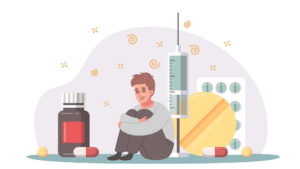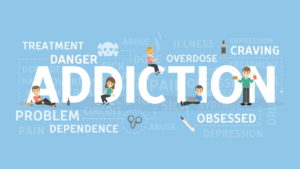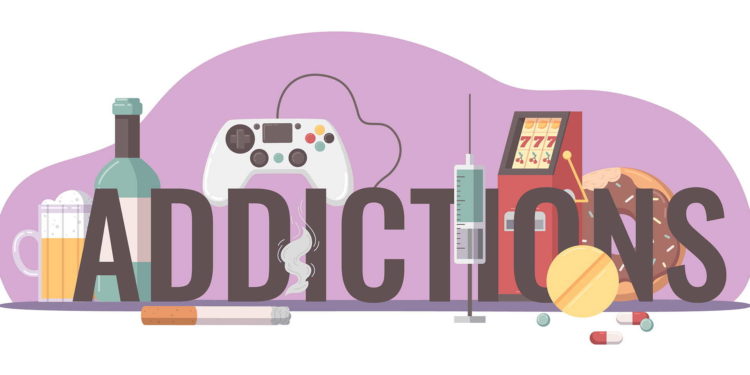Addictive Behaviors have always been an issue, however, the current generation is falling into it majorly with some horrible consequences. It isn’t rocket science but some most common things we do daily or frequently that build addiction.
If we think of it this way, for most individuals, wasting time, playing video games, scrolling, or always engaging in fun things is just an enjoyable pastime. Without realizing these activities, however, have the potential to become addictive and problematic for some percentage of people, they just listen to their procrastination.
That is where the Addictive Behavior pops out.
Particularly among young people or this new generation, Addictive aspects are common and sadly rising. The problem is when people feel or get mental health or psychological health issues.
People get so engrossed that it begins to interfere with their everyday lives or Behavioral health and they overlook their relationships, career, or education.
Moreover, the usage of computers, smartphones, the Internet, and other electronic gadgets has increased dramatically during the last few decades. Although consumers and society have benefited greatly from this increase, there have also been instances of excessive use that have had detrimental effects on health.
Understanding Addictive Behavior

Repeatedly engaging in activities or behaviors despite negative consequences is referred to as addictive behavior. Simply, when you have a Lack of control, compulsive involvement, and determination in the face of negative impacts on your physical or mental health or social connections this is not good news because you have become Addictive.
It is like something is playing with you or disturbing your brain system and creating a nasty cycle of craving, consumption, and unfavorable outcomes.
The story does not end here. It starts impacting your mental and physical health because when you are addicted to something, it enters the zone of too much. Imaging something is always hunting you and you can’t think otherwise.
You have inadequate exercise routines and unhealthy eating habits; you feel issues with hearing or vision or other health problems, you often suffer a Lack of sleep, depression, or a lot of odd stuff because you are not doing justice with your life.
Understanding Behavioral Health

Behavioral health refers to the connection between behaviors and the health and well-being of an individual. It includes a wide range of conditions, including mental health disorders, substance use disorders, and problematic behaviors, and requires prevention, diagnosis, treatment, and recovery support for conditions such as depression, anxiety, addiction, and other challenges.
. It focuses on how behaviors, habits, and actions affect a person’s physical and mental health, as well as their overall quality of life.
Addictive Behavior and Mental Health

The relationship between actions and general health, including mental health, is referred to as behavioral health. Repeatedly engaging in activities, drugs, or behaviors despite negative consequences is known as addictive behavior, and it is an important component of behavioral health.
Mental health illnesses and addictive activities are frequently associated with one another. For instance, those who battle addiction may also deal with mental health issues like anxiety, depression, trauma-related disorders, or other behavioral health issues.
Addictive conduct and behavioral health have a complicated interaction. A common coping strategy for fundamental emotional or psychological discomfort is engagement in addictive activities. On the other hand, participating in addictive activities might worsen pre-existing mental health conditions or cause the emergence of new ones.
For the purposes of diagnosis, treatment, prevention, and recovery support, an understanding of this link is essential. Addressing the addictive conduct and any primary mental health issues at the same time is often essential for an effective solution. This method can enhance people’s general well-being and quality of life while assisting them in achieving and maintaining recovery

Furthermore, a comprehensive approach to therapy is made possible by addressing addictive behaviors within the context of behavioral well-being. It acknowledges that addiction is impacted by biological, psychological, and social variables in addition to willpower. People who struggle with addictive habits can get the help and care they require to achieve long-term recovery and well-being by addressing these variables in their entirety.
Our behavioral well-being has a significant impact on how we perceive the environment and who we are as individuals throughout our life journey. Even if addictive habits are difficult, they are not impossible barriers. We can overcome these obstacles, mend from our wounds, and come out stronger and more resilient than before if we have bravery, compassion, and support.
If things go super difficult in Addictive Behavior, asking for help is a show of strength. Together, we can overcome challenges, see hope, and create a more promising future that is full of happiness, fulfillment, and purpose.













